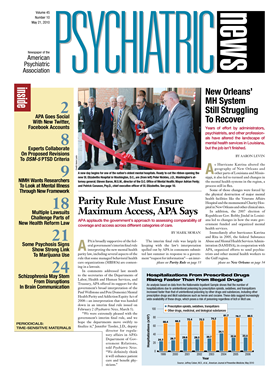Marijuana use among individuals with schizophrenia is associated with more severe positive psychotic symptoms over time, according to a 10-year longitudinal study posted online May 15 on AJP in Advance.
Researchers found that changes in cannabis use at four follow-up points over the 10-year period were associated with similar direction changes in positive psychotic symptoms of delusions and hallucinations over time; if subjects stopped using cannabis, their symptoms decreased, and if they started or increased use, their symptoms increased. This remained true even after controlling for gender, age, socioeconomic status, other drug use, antipsychotic medication use, and other symptoms.
Previous studies have shown cannabis use to be associated with worse schizophrenia outcome generally, but this new study is unique in disaggregating effects on specific symptom domains. The investigators looked at the effect of cannabis use on positive, negative, depressive, and disorganized symptoms, as well as overall severity, and found that the effect of marijuana use is specifically on the positive symptoms of delusions and hallucinations.
“Our contribution was to look at specific aspects of outcome, focusing on five symptom domains from the beginning of the clinical illness until 10 years out and tracking marijuana use and symptom domains over time,” said coauthor Roman Kotov, Ph.D. “We found that cannabis use in schizophrenia is associated with worse outcome in one specific area, namely positive symptoms of psychosis.”
Kotov is a professor of psychiatry at the State University of New York–Stony Brook. In the study, 229 patients with a schizophrenia spectrum disorder were recruited from the inpatient units of the 12 psychiatric facilities of Suffolk County, N.Y., between 1989 and 1995.
The interviews included the Structured Clinical Interview for DSM-III-R and, later, DSM-IV, administered by trained master's-level mental health professionals. Cannabis use and age at first use were assessed as part of the substance use disorders module of the Structured Clinical Interview for DSM-IV Disorders (SCID); participants were asked about cannabis use in the previous 30 days at baseline and at 10 years, and about their use in the previous six months at the six-month, two-year, and four-year follow-ups.
Positive, negative, and depressive symptoms in the month preceding each interview were assessed with the Scale for the Assessment of Positive Symptoms, the Scale for the Assessment of Negative Symptoms, and the SCID depression module, respectively. Illness severity was assessed with the Global Assessment of Functioning rating for the worst week in the prior month.
On average, individuals who were current cannabis users at the baseline interview were younger at first admission and had an earlier age at onset of psychotic symptoms. Consistent with prior studies, the researchers found that the risk of psychosis onset in any given year following exposure to cannabis doubled compared with the risk among same-age nonusers; statistical analysis revealed that changes in cannabis status were linked with changes in psychotic symptoms even after adjusting for the covariates and other symptom domains.
Of the five symptom domains, positive psychotic symptoms were most strongly associated with current or prior cannabis use. The only other symptom domain significantly associated with cannabis use was depression severity among users at year 2. Interestingly, there was a statistically small inverse correlation between marijuana use and disorganized symptoms, suggesting that some users may use cannabis to self-medicate disorganized symptoms.
Moreover, the association between cannabis use and positive symptoms appears to be “bidirectional,” said lead author Daniel Foti, a Ph.D. student at SUNY–Stony Brook. “We were able to look at changes over time and say that cannabis use predicts more positive symptoms in the future, but also that more positive symptoms were able to predict cannabis use,” he told Psychiatric News.
Foti said the findings suggest clinical implications for both prevention and treatment of psychosis and prevention of marijuana use.
“If your goal is to reduce the severity of psychotic symptoms in a population, one avenue is to have people cut back on or stop marijuana use, because it appears that marijuana has a direct effect on symptoms,” he said. “If you have marijuana prevention in mind, the people who might benefit most are those who already have elevated symptoms. On the basis of our findings, those are the people who should be targeted with prevention efforts.”
“Cannabis Use and the Course of Schizophrenia: 10-Year Follow-Up After First Hospitalization” is posted at <http://ajp.psychiatryonline.org/pap.dtl>. The study is scheduled to appear in the print edition in August. 
